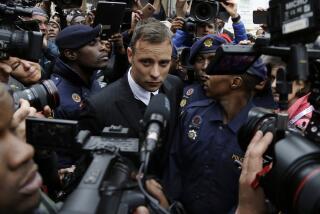S. Africa Frees Church Leader, Curbs Activities
- Share via
JOHANNESBURG, South Africa — The general secretary of the Presbyterian Church in South Africa, one of the most prominent detainees held under the state of emergency, was released Friday from nine months’ detention but was placed under a series of restrictions prohibiting political activities.
The Rev. Jean-Francois Bill, 53, had been held under emergency regulations permitting political prisoners to be detained indefinitely without trial.
Bill, who was arrested by security police June 20, was held on suspicion of assisting the outlawed African National Congress, but prosecutors said last month that they lacked sufficient evidence to charge him formally and bring him to trial and that they thus preferred to detain him under the emergency regulations.
Adriaan Vlok, the minister of law and order, said in authorizing Bill’s release, “After considering all the aspects relating to the Rev. Bill’s particular circumstances, his continued detention is no longer necessary.”
Bill’s release had been sought by other churchmen here and abroad, including the moderator of the country’s influential Dutch Reformed Church, and by the Swiss government because Bill holds Swiss as well as South African citizenship.
About 20 other clergymen, including Father Smangaliso Mkhwatsha, general secretary of the Southern African Catholic Bishops Conference, are believed to be still in detention. Another is currently on trial, charged with terrorism, in Ciskei, one of South Africa’s nominally independent tribal homelands.
According to civil rights monitoring groups, more than 25,000 people have been detained without charge under the state of emergency and other security laws; about 7,500 are still believed held.
In another action, Vlok prohibited the 600,000-member Congress of South African Trade Unions from holding a rally Sunday in Soweto, the black ghetto town outside Johannesburg, to launch its new campaign for “a living wage.”
But union officials, who said that planned meetings in other areas had also been banned, said they would seek a court order today overruling Vlok. With 15,000 people expected, the Soweto rally, which had been approved by a local magistrate, would have been the first such major public meeting in a black township for many months.
Jay Naidoo, the union federation’s general secretary, said the campaign was intended to close the gap between inflation--now at more than 18% a year--and pay increases averaging only 10% or 12% for blacks.
President Pieter W. Botha, speaking at an election rally for his National Party, reiterated his commitment to continued racial segregation of residential areas but said he is prepared to apply those laws flexibly and perhaps amend them.
“We are investigating the Group Areas Act,” he said, referring to the law specifying certain areas for each race, “and we are prepared to amend it and improve it to remove obstacles. But we are not prepared to tamper with the principle of (racially segregated) ‘own’ residential areas.”
“As long as I am head of this government, I am not prepared to allow the established rights of these communities--white, black, Colored (mixed-race) and Indian--to be undermined,” he told party supporters. “These rights must be protected.”
Such residential segregation is of “the utmost importance,” Botha said, to protect “the poor white workers” so that their neighborhoods do not become slums with the influx of large numbers of blacks. “The rich white man can afford to pay for his apartheid in exclusive areas,” Botha added, “but the poor white man has to live where he can afford to.”
More to Read
Sign up for Essential California
The most important California stories and recommendations in your inbox every morning.
You may occasionally receive promotional content from the Los Angeles Times.













